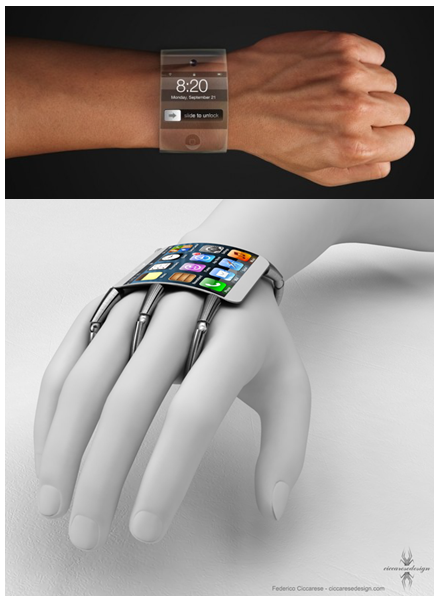(Editor’s Note: Dan Munro is a contributing editor to Forbes. His columns are collected under the heading, “The HealthCare Compass.)
(Editor’s Note: Dan Munro is a contributing editor to Forbes. His columns are collected under the heading, “The HealthCare Compass.)
Wearable tech isn’t new but Credit Suisse (as cited by Barron’s here) is calling it “the next big thing” and forecasting the market to ramp from about $3B – $5B today to $50B over the next 3-5 years. The implications and opportunities for clinical healthcare (not just fitness/wellness) are intriguing. As this unfolds, it could easily be that the Credit Suisse forecast is overly conservative. One of the slides in the Credit Suisse report included many of the devices that are well known in the mobile and digital health circles – including the new Shine by Misfit Wearables.

There’s good reason to be bullish. At a health conference last year – the CIO of a teaching hospital shared a provocative statistic that his organization had uncovered in their ROI analysis of a large iPad purchase. At the time, the hospital was debating the merits of such a large financial commitment – so they tasked the CIO to do a crude ROI analysis to justify the sizable expense. Was the ROI 6 months – or maybe a year? The (unscientific) results were jaw dropping. Using some crude calculations around workflow and time-motion analysis the CIO calculated the ROI for an iPad in their hospital would be 9 days. That’s right – 9 days.
Now, let’s say the CIO was wrong – by a factor of 2. The ROI would be 18 days. Say he was wrong by a factor of 3 – the ROI would be a month? You get the point. In this case it isn’t “wearable” technology per se, but mobile technology in general that has the potential to be truly trans-formative in a healthcare setting. That won’t happen everywhere – at least not yet. Seattle Children’s Hospital is an example of a polar opposite experience. In their case, they returned an entire shipment of iPads as “unusable” in their clinical setting (here). Clearly there will be speed-bumps on our road ahead.
But here’s the follow on question that I haven’t heard in my travels. What’s the ROI of a smartphone (with cell/data plan) in the hands of a chronically ill patient – and shouldn’t we know that too? The data alone has such incredible value – and using cloud services, the cost is getting exponentially cheaper to collect, store, manage and analyze that data. It also seems that just about everybody else in the healthcare ecosystem is making money on that data – our data. Providers, EHR vendors, hospitals, payers, pharmaceutical and genetics companies – to name a few. Shouldn’t we find a way to subsidize the collection of this data at the source?
As the forecast from Credit Suisse suggests, we’re working our way there, of course, but at least on the clinical side of healthcare – it’s a circuitous route. The logical hub for a variety of wearable devices is clearly the smartphone, but to be truly “patient-centric” we need to accelerate to the point-of-view of the actual patient – and that needs to be a much more seamless experience. That will logically include wearable devices.
At least so far, the health-tech focus seems to be overly provider-centric. No argument with that logic because the first question every technology solution has to answer is who will pay for this? Healthcare is definitely different, though, and also has the unique opportunity to re-frame the question. What’s the cost of keeping people out of the hospital?
Of course we’re not really ready to ask that question in our current system of mis-aligned incentives. From my list of top 10 quotes for 2012 (here):
#2: “How many businesses do you know that want to cut their revenue in half? That’s why the healthcare system won’t change the healthcare system.” Rick Scott – Governor of Florida (as quoted by Vinod Khosla) – Rock Health Innovation Summit – August (video here)
In the case of the iPad, it’s an easy and compelling ROI – but that’s not a solution at the core. It’s a circuitous route because we don’t (yet) think of the huge ROI with better health. We wouldn’t need to think in those terms – except that hospitals today have become the cost equivalent of staying in a Platinum 5-star resort under the Four Seasons moniker.
In fact, medical tourism often includes recovery options in actual 5-star resorts. They include that luxury as a way to lure us to a distant facility for joint-replacement – or even heart surgery – because it’s still cheaper – even with the lavish resort cost. Come to Thailand for that double-bypass – and recover in the 5-Star Four Seasons on the world-renowned island of Phuket. You’ll want to be careful in the salt water with those stitches, but your view could easily look like this:
Before we get too far afield with all this trans-formative thinking, is there a way we can tie any of this back to real world examples? Sure. How about this one by Ezra Klein for Bloomberg View last week titled Oregon’s Radical Health Overhaul Blazes New Trail. The article opens by asking if we’ve heard the air-conditioner story.
“Here’s the air conditioner story: There’s a 90-year-old woman with well-managed congestive heart failure who lives in an apartment without air conditioning. A hot day could send the temperature in her apartment high enough that it strains her cardiovascular system and kicks her into full-blown congestive heart failure. Under the current system, Medicare will pay for the ambulance and $50,000 to stabilize her. It will not pay for a $200 window air conditioner, which is all she needs to stay in her home and out of the hospital.”
It’s a circuitous route we’re on all right. The ROI is there and it doesn’t take an excel spreadsheet for the math. Some patient-centric thinking and wearable tech might help though. Especially when you add that wearable tech to a smartphone hub. Credit Suisse seems to think at least some of that wearable tech will arrive in the next 3-5 years. An Apple iWatch (or maybe wearable iPhone?) could easily be one of those arrivals.











